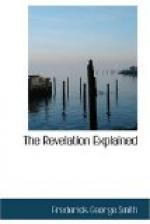The condition of this church, according to the burden of the message, was worse than that of any of the others; for there is not only no commendation of former faith and piety, but it is not even said of them, as of the church at Sardis, that a few names were left who had not defiled their garments. Christ, who here represents himself in the character of the “faithful and true Witness,” testifies that they are “neither cold nor hot.” They did not have enough piety nor zeal to cause them to do anything for the honor of Christ and his cause, neither were they open enemies. They were merely lukewarm, insincere friends, and, as such, were in a position to do the greatest harm. A certain writer has said, “We always dread a professed but insincere friend; he is the least desirable of all relations.”
They are further described as being satisfied to remain in their lukewarm condition, indulging themselves in the riches and the pleasures of this life. Theirs was a rich, prosperous, influential church in their estimation, and they were proud of it; but “the faithful and true Witness” declares that they were “wretched, and poor, and blind, and naked.” What a contrast this congregation presents with the churches of Smyrna and Philadelphia, whose poverty and “little strength” are expressly mentioned, but who were rich in spirituality, and who received no reproof, but words of comfort! They of Laodicea possessed no true gold from the mine of gospel truth, no white raiment of righteousness to hide their spiritual nakedness, no clear vision to enable them to discern the things of the Spirit. In fact, they lacked everything necessary to constitute a church of which the Lord could approve and which would be an honor to his cause. But notwithstanding their sad condition, Christ still pleads with them to repent of their doings and to allow him to come in and sup with them, promising the overcomer the privilege of sharing the throne of his Redeemer.
On account of their lukewarmness a severe threat was uttered—“I will spue thee out of my mouth.” Allusion is doubtless made to the former catastrophe that overthrew the city under Tiberius, thus giving them warning of the destruction that might come upon them in the future. The result has been in accordance with the prediction. God spued that church out of his mouth centuries ago, and nothing remains of that proud, wealthy city. Not even a Turk has any fixed residence on the spot. Its ruins alone remain in their desolation, “rejected of God, deserted of man, its glory a ruin, its name a reproach.” The Encyclopaedia Britannica says, “Its ruins are of wide extent.... There is no doubt, however, that much has been buried beneath the surface by the frequent earthquakes to which the district is exposed.”




